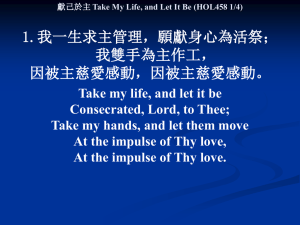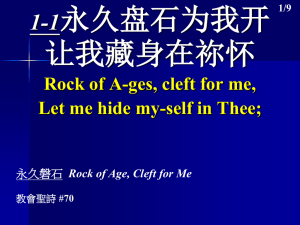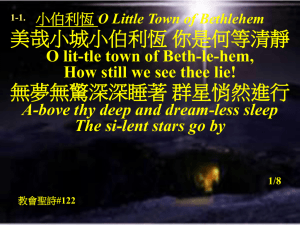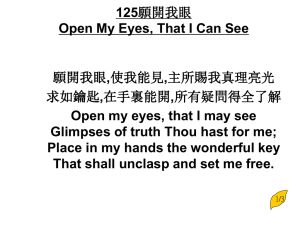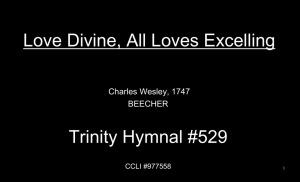bailun (2)
advertisement
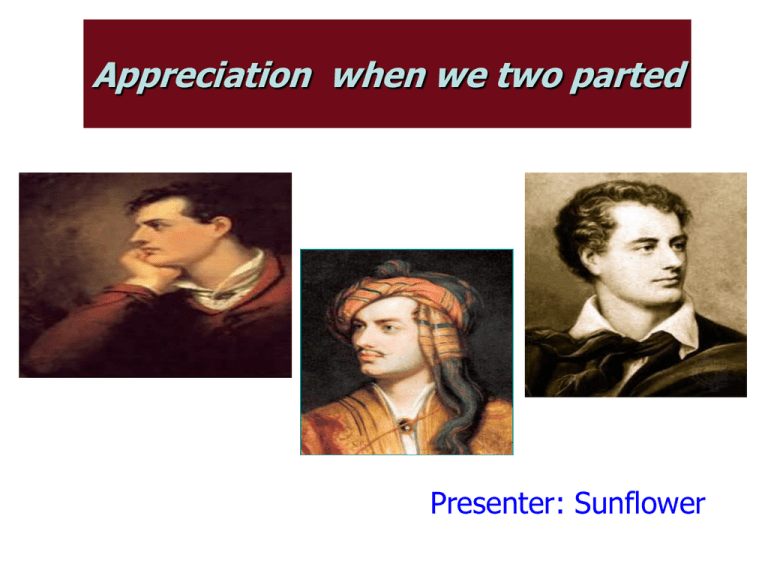
Appreciation when we two parted Presenter: Sunflower Poetry Outline • George Gordon Byron: General introduction • Analysis on the poetry • Compare with the China’s poem George Gordon, Lord Byron George Gordon ,Lord Byron (1788-1824) was as famous in his lifetime for his personality cult as for his poetry. He created the concept of the 'Byronic hero' - a defiant, melancholy young man, brooding on some mysterious, unforgivable event in his past. Byron's influence on European poetry, music, novel, opera, and painting has been immense, although the poet was widely condemned on moral grounds by his contemporaries. Byron’s main works Childe Harold’s Pilgrimage 哈罗德游记 Oriented Tales (oriental settings and heroic heroes) 东方叙事 Don Juan----his masterpiece 唐璜 昔日依依惜别, When we two parted 泪流默默无言; In silence and tears, 离恨肝肠断, Half broken-hearted 此别又几年。 To sever for years, Pale grew thy cheek and cold,冷颊向愕然, 一吻寒更添; Colder thy kiss, Truly that hour foretold Sorrow to this! 日后伤心事, 此刻已预言。 The dew of the morning 朝起寒露重, 《上邪》原作为:“上邪,我欲与君相 Sunk chill or my brow 凛冽凝眉间 知,长命无绝衰。山无陵,江水为竭,冬 It felt like the warning 彼时已预告: 雷震震,夏雨雪,天地合,乃敢与君 Of what I feel now. 悲伤在今天。 绝!”上邪》出自于汉乐府民歌。这是一 Thy vows are all broken,山盟今安在 首情歌,是主人公自誓之词:海枯石烂, And light is thy fame; 汝名何轻贱! 爱情仍然坚贞不变。 I hear thy name spoken, 吾闻汝名传, And share in its shame. 羞愧在人前。 They name thee before me,闻汝名声恶, A knell to mine ear; 犹如听丧钟。 A shudder comes o'er me 不禁心怵惕—— Why wert thou so dear? 往昔情太浓。 Thy know not I knew thee 谁知旧日情, who knew thee too well: 斯人知太深。 Long,Long shall I rue thee 绵绵长怀恨, Too deeply to tell. 尽在不言中。 In secret we met— In silence I grieve 昔日喜幽会, 今朝恨无声。 That thy heart could forget, 旧情汝已忘, Thy spirit deceive. 痴心遇薄幸。 If I should meet thee 多年惜别后, After long years, 抑或再相逢, How should I greet thee ? 相逢何所语? With silence and tears. 泪流默无声。 Analysis of the poem Theme : a love story between a man and a woman , an expression of feelings of hate from the man towards the woman because she left him. It’s a very typical Romantic poem, typical of a Romantic writer like Lord Byron, who expresses his feelings of love, a typical issue of Romanticism. structure The poem contains four stanzas of eight verses each one. There are, also, four kinds of rhyme in each stanza. In the first four verses of each stanza, odd verses have a rhyme, and even verses have another rhyme, and this method is used by the writer in the last four verses of each stanza with a rhyme for each pair of verses as I said before. Sentences analysis the contrast between two verses (the second one and the last one), seemingly equal in form but with different meanings, it depends on what the previous line said. In the first pair of verses (When we two parted/ In silence and tears) the man feels true love towards his beloved, but she, as wene will see some verses later, does not, and the last verse is the definitive confirmation of what he feels is disgust and pity because of what could be and was not. images The cold is a very important metaphorical element at the beginning of the second and the third stanzas: The dew of the morning/ Sunk chill on my brow: here the cold is shown as a metaphor of the feelings that the man has towards the woman, as it happens too in A knell to mine ear/A shudder comes o’er me: dew, chill, knell and shudder are words that symbolize cold in many different ways. In the last stanza, the two first verses have two words that may be synonyms, but they mean a totally different thing, they are the contrast of the poem: In secret we met, here Byron wants to transmit the passion of two lovers in their first secret encounter. And In silence I grieve symbolizes that nobody can help this man to come back to smile after having been left by the woman he loved. The two following verses, That thy heart could forget/ Thy spirit deceive say what she made him: she forgot him and she deceived him. 《古诗十九首》与Byron when we two parted 的比较鉴赏 关于《古诗十九首》与When we two parted的比较。 下面我们仔细比较一下拜伦的When We Two Parted When (《昔日依依别》)。拜伦的诗句,有不少与《古诗》非常的 相似。 第一条,拜伦用了他的诗的第一句作为题目。并且这个题目与 《古诗·行行重行行》的第二句意思一样。When we two parted《昔日依依别》。而整首诗的主题也与《古诗》(本文 所分析鉴赏的几首诗)有类似之处。 第二条,In silence and tears, (独坐泪如雨)与“泪下沾裳 衣”相似。但由于因思念而哭泣,应该算是人类普遍的情感, 所以在那种语言中出现都不算意外,所以这个相似更多像巧合。 第三条,Half broken-hearted(相思至心碎)/To sever for years,(别去已经年)两句与“相去日已远,衣带日已缓。” 很相似。如果用《古诗》原句翻译,也未尝不可。 第四条,Truly that hour foretold(不幸而言中)/ Sorrow to this!(伤悲有如是)表现出的女主人公的怀疑与“浮云蔽 白日,游子不顾返”所蕴含的疑虑,也有不约而同之处。 第五条,It felt like the warning(似有不祥兆)/Of what I feel now.(如我早相知)/Thy vows are all broken,(誓言皆 违背)/And light is thy fame;(君只寻荣光)/I hear thy name spoken, (据言君名扬)/And share in its shame.(毁 誉各参半)与《古诗》稍有不同,《古诗》中的背叛,并没有在 诗歌中成为事实,而仅仅是思妇的疑虑。此处便表现出朱光潜 先生所言的中西诗的不同了。 关于中国诗歌和外国诗歌,朱光潜认为:西诗以直率胜,中诗 以委婉胜;西诗以深刻胜,中诗以微妙胜;西诗以铺陈胜,中 诗以简隽胜。比如柯勒律治(Samuel Taylor Coleridge)的 诗句“To meet, to know, to love and then to part,(相遇, 相知,相爱,然后别离,)”“Is the sad tale of many a human heart. (多少人伤心的故事啊) 木兰花令 拟古决绝词 纳兰容若 人生若只如初见,何事秋风悲画扇? 等闲变却故人心,却道故人心易变。 骊山语罢清宵半,泪雨零铃终不怨。 何如薄幸锦衣郎,比翼连枝当日愿。 • 词题:这是一首拟古之作。古诗中的《决 绝词》,是以女子的口吻控诉薄情郎,从 而表示与之决绝。唐元稹有《古决绝词》 三首。在纳兰容若的词集里,有的版本中 词题为:“拟古决绝词柬友”,显然这种 “闺怨”是一种假托,。据专家称:这是 纳兰的特有隐情的表现。

